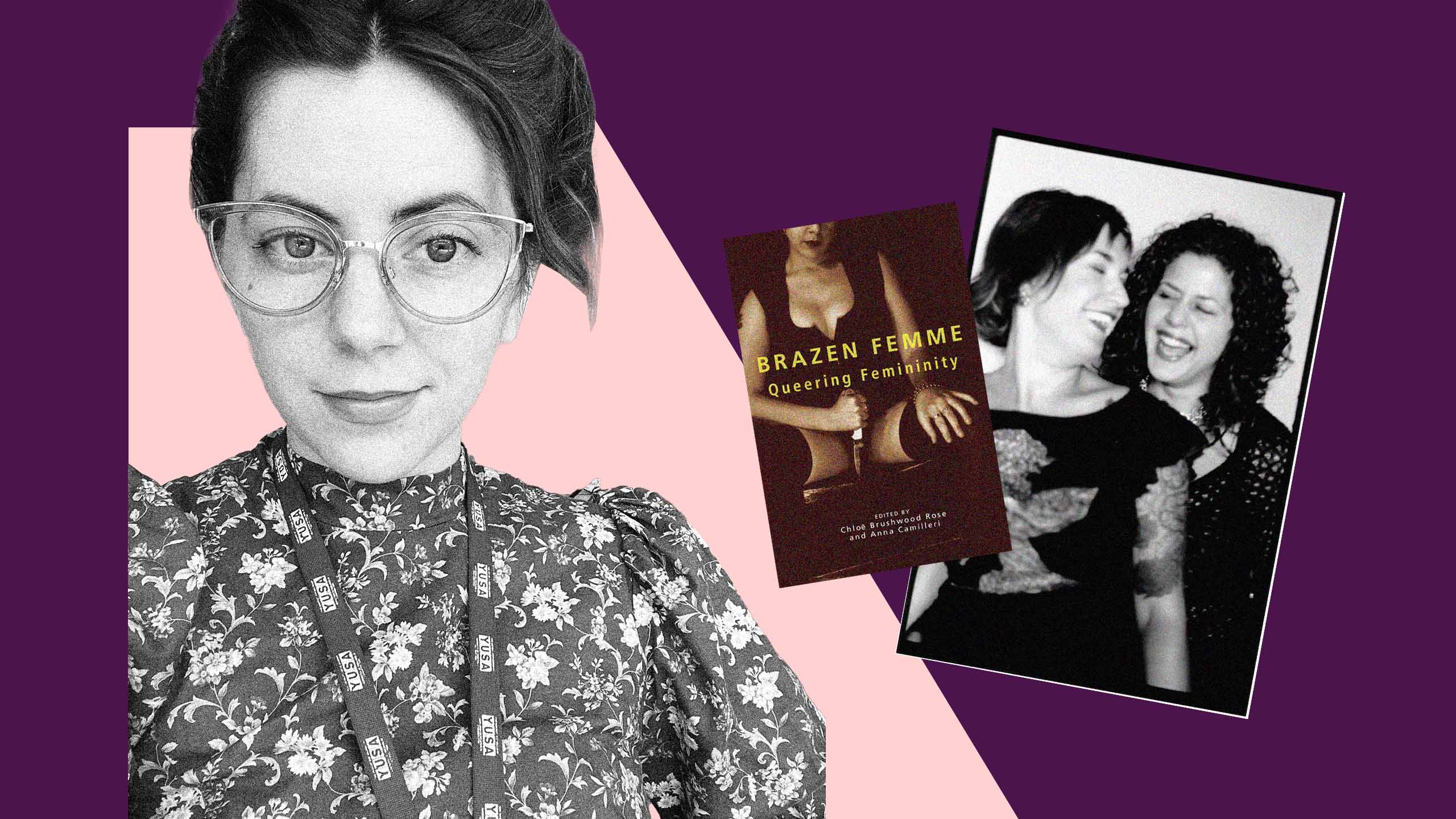Twenty-one years ago, Arsenal Pulp press published Brazen Femme: Queering Femininity, an anthology of essays, poetry, art and other expressions creating a collection of works by 22 femmes. The book was edited by writer and professor Chloë Brushwood Rose and writer and artist Anna Camilleri.
“We wrote lots of letters to people that no one ever replied to; we wrote actual letters. You had to write letters and send them,” Brushwood Rose says. “Arsenal was just starting out at the time, and they were really receptive. We contacted a lot of other publishers that never responded to us, and then they gave us a better sense of what we needed to address. But in a way we were just totally flying by the seat of our pants.”
Now the book is a part of queer history, noted by many as one of the first of its kind. Its staying power has led to the creation of Still Brazen: Twenty Years of Queering Femininity, a six-episode podcast that puts some of the original contributors, most of whom are now in their 50s, in conversation with femmes in their 20s and 30s who found something of themselves within the pages.
The popularity of the anthology led to a second printing in 2010, and exceptional reviews by both professional critics as well as casual readers.
“I had a [copy of the] second printing and I think … that’s the wave of publication that I picked up, and I think a lot of people on the podcast and who are on the younger side also found its second printing,” scholar, writer and creator and producer of Still Brazen, Andi Schwartz, says.
She, like many of the millennial guests on the podcast, found her femme identity in a way that was deeply entangled with the book.
“Most people I invited on to be in conversation with the contributors would tell this kind of similar story: ‘I read this book and I was like, that’s who I am. I make sense.’ For a lot of people, because this book is not an academic book, even though there are some academic pieces,” Schwartz says, “a lot of people could get it and read it, and there’s poetry in it, there’s artwork in it. It’s a really great introduction.”
Schwartz doesn’t remember the first time she read Brazen Femme, but she still goes back to the same copy she picked up in her early twenties.
“In my copy of it, these pages have been opened so much, the binding has been cracked and many of the pages are falling out of the introduction,” she says.
Schwartz started her grad program at York University in 2012 where her advisor, Bobby Noble, a professor in the liberal arts faculty, upon learning of Schwartz’s master’s topic of femme identity and femme knowledge production on Tumblr, quickly pointed her in the direction of Brushwood Rose, a fellow professor in the Faculty of Education.
The two quickly found an easy connection and have worked together in various capacities over the last decade, finding important conversations coming out of their respective generational perspectives.
“Since I’ve worked with Chloë for so long, I feel like I’ve always had that [intergenerational connection] in my own life. I’ve always had a relationship with someone who’s a little bit older than me who’s also a femme, who is also thinking about femininity,” Schwartz says. “I think it’s really important to have that connection, to look at where we can continue to be aligned and where we continue to agree. But then point out what are the things that have changed, and what are the things that changed for the better and also, what are things that have changed that we don’t love.”
During their time knowing one another, Brushwood Rose has been telling Schwartz stories of Toronto in the ’90s.
Toronto in the ’90s was a haven of cabaret shows, backyard poetry readings, dance nights and cafés where queers would gather and femmes would be ever-present, Brushwood Rose recounts. She found herself embracing her femme identity in these spaces where femmes were loud and open about their place in the community.
“A lot of the pieces are actually by Toronto authors, or they were based in Toronto at the time, and so it really captured this moment, and I think for a lot of people who are coming to it, it really opened up a lot of possibilities,” Schwartz says. “In Kathryn Payne’s episode, she talks about the kind of nuances between the femme scene in Toronto and in San Francisco, where she also spent a lot of time … and how femme had a specific kind of role and impact in Toronto, that was quite unique to the community.”
Shortly after moving from Vancouver to Toronto in 1995, Brushwood Rose met Anna Camilleri, finding the femme friendship that led to the creation of the anthology. At the time it was rare to even hear the word “femme” without “butch” beside it, Brushwood Rose says. Through Brazen Femme, Brushwood Rose and Camilleri wanted to explore what femme could be without being defined as an opposite to something else.
“We had to kind of really flip the script on gender and on sexuality; at the time there had been no representations of femme tops in queer porn or queer publications, for example. Femme was not understood as a position of power,” Brushwood Rose says.
Brazen Femme allowed the contributing femmes to write and create art around the uniqueness of femme identity and community in their lives and eventually led younger generations of femmes to find understanding, in themselves and in their femme identities.
“There’s a way that in any civil rights movement, and it felt for us in a kind of civil rights movement within the queer community, that sometimes it requires a kind of insistence on it that requires you to take up space and assert power initially, so that you then have the opportunity to be seen as a more complex subject,” Brushwood Rose says.
Intergenerational connection ended up being the concept of the podcast. The first episode has Schwartz, Brushwood Rose and Camilleri in conversation with each other, using the introduction, “A Brazen Posture,” which Brushwood Rose and Camilleri wrote for Brazen Femme, as the basis of their conversation.
“It was incredible. It was so cool. I really love intergenerational exchange. Something I really value is the perspective of people who are older than me,” Schwartz says. “I definitely cried when they’re talking about their friendship and what femme meant to them in their lives.”
While working on the podcast, Schwartz found the conversations that developed were more than she could have hoped for. The pairs of femmes were brought together based on their areas of work, such as matching up poets Trish Salah and Leah Horlick. Other pairings include Kathryn Payne and Sarah York-Bertram, Anurima Banerji and Jade Crimson Rose Da Costa and Zoe Whittall and Allison Taylor.
“I really let the people whom I paired up take the lead and that’s because they actually had way more in common with each other and could ask more interesting questions than I ever could, because I don’t have the experience, or I work in a different format, so people who were both poets, they played off each other with really smart, interesting questions about poetry that were just, like, amazing,” Schwartz says.
This is the first podcast that Schwartz has produced, and she found the format to be ideal. Instead of worrying about how many people can attend a one-time talk, she now has recorded conversations that can last for generations in the ArQuives, Canada’s LGBTQ2S+ archive.
“Listening back and editing all of these episodes, I just have all of these great recordings of femme laughter and femme joy. And it was really, really beautiful,” Schwartz says.
The podcast launches Oct. 21 with an in-person listening party at the ArQuives in Toronto, where attendees will get to hear all six episodes before they go live online and see ephemera from the early days of Brazen Femme. Still Brazen will be available to stream on Spotify, YouTube and Apple Podcasts.


 Why you can trust Xtra
Why you can trust Xtra


